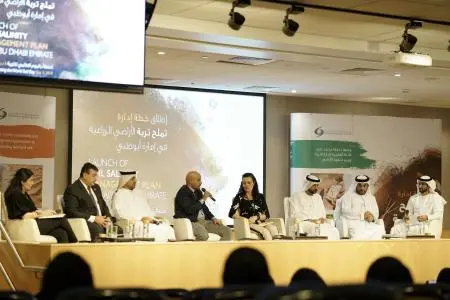PHOTO
Abu Dhabi: To celebrate World Soil Day, which falls on December 5th every year, the Environment Agency - Abu Dhabi today launched a plan to manage soil salinity in the Emirate of Abu Dhabi, which is considered one of the most important challenges facing the agricultural land sector and a major cause of soil degradation and reduced productivity. The plan is considered as one of the most important outputs of the soil salinity survey project in agricultural lands, which was implemented over a period of three years and with the participation of all concerned authorities.
The plan seeks to develop a sustainable model for the optimal use of available soil and water resources, to provide farmers with a clear vision, and to enhance their role as suppliers of healthy local agricultural products. This includes recommendations and necessary procedures for each agricultural region, where a description of the current situation of irrigated soil and water irrigation, and sustainable procedures in each area.
The plan was launched in an event organised by EAD in the presence of representatives from a number of government entities at the federal and local levels.
Eng. Shaikha Al Hosani, Executive Director of the Environmental Quality Sector, said: "Soil management, in its comprehensive concept, exceeds recommendations related to crop management, to include other important issues such as the development of integrated policies and strategies concerned with issues related to soil, water resources, food security, agricultural and economic development, and others. The existence of clear policies is an essential element in the success and sustainability of natural resource management in any country of the world.”
Al Hosani, pointed out that "the soil monitoring programme implemented by EAD has contributed to understanding the seasonal changes that occur in the state of agricultural soils during the seasons of the year, and this will help define key performance indicators to measure the success of the implementation of any soil management plan in the future".
She stressed the possibility of identifying lands and soils suitable for irrigated agriculture by relying on the data and maps provided by the Groundwater Well Inventory Project and Soil Salinity Survey project, in addition to the data and maps available in EAD's Soil Information System (UAESIS) database. She added that more standards and factors should also be taken into consideration such as infrastructure requirements, accessibility to areas, and so on.
Eng. Bayan Athamneh, Manager of the Soil Quality Section indicated: “This plan is one of the most important results of the survey that the Agency implemented to assess the levels of soil salinity in agricultural lands, between 2015 and the end of 2018. The survey included 4.000 farms in the Emirate of Abu Dhabi, where it measured the level of soil quality and the quality of irrigation water More than 4000 soil samples were analysed to identify soil salinity, which contributed to the development of specific recommendations specific to each irrigated area with regard to soil use, irrigation water, and how to manage soil salinity.
"We developed the Soil Salinity Management Plan, with our partners, which will enable us to optimise the use of available water resources and reduce the spread of agricultural land degradation due to soil salinity," Athamneh said.
The event included a panel discussion session entitled "Soil Salinity in Agricultural Lands in the Emirate of Abu Dhabi" with the participation of Abu Dhabi Agriculture & Food Safety Authority, the United Arab Emirates University / College of Agriculture and Food Sciences, the Ministry of Future Food Security, the Ministry of Climate Change and Environment and EAD.
- Ends -
About Environment Agency – Abu Dhabi (EAD)
Established in 1996, the Environment Agency – Abu Dhabi (EAD) is committed to protecting and enhancing air quality, groundwater as well as the biodiversity of our desert and marine ecosystem. By partnering with other government entities, the private sector, NGOs and global environmental agencies, we embrace international best practice, innovation and hard work to institute effective policy measures. We seek to raise environmental awareness, facilitate sustainable development and ensure environmental issues remain one of the top priorities of our national agenda.
For media enquiries, please contact:
EAD Press Office:
Environment Agency- Abu Dhabi
Tel: +9712 693-4637
Mobile: +97150 442-5096
Email: pressoffice@ead.ae
Website: www.ead.ae
Stay updated with our latest news! Click below to follow, like and subscribe:
@EADTweets
Environment Agency
- Abu Dhabi
Environment Agency
- Abu Dhabi
EnvironmentAbuDhabi
Disclaimer: The contents of this press release was provided from an external third party provider. This website is not responsible for, and does not control, such external content. This content is provided on an “as is” and “as available” basis and has not been edited in any way. Neither this website nor our affiliates guarantee the accuracy of or endorse the views or opinions expressed in this press release.
The press release is provided for informational purposes only. The content does not provide tax, legal or investment advice or opinion regarding the suitability, value or profitability of any particular security, portfolio or investment strategy. Neither this website nor our affiliates shall be liable for any errors or inaccuracies in the content, or for any actions taken by you in reliance thereon. You expressly agree that your use of the information within this article is at your sole risk.
To the fullest extent permitted by applicable law, this website, its parent company, its subsidiaries, its affiliates and the respective shareholders, directors, officers, employees, agents, advertisers, content providers and licensors will not be liable (jointly or severally) to you for any direct, indirect, consequential, special, incidental, punitive or exemplary damages, including without limitation, lost profits, lost savings and lost revenues, whether in negligence, tort, contract or any other theory of liability, even if the parties have been advised of the possibility or could have foreseen any such damages.




















